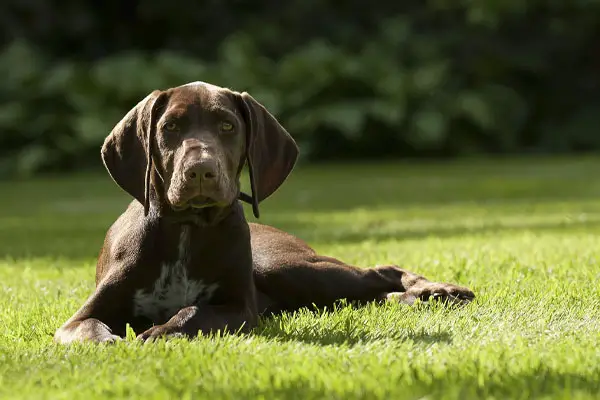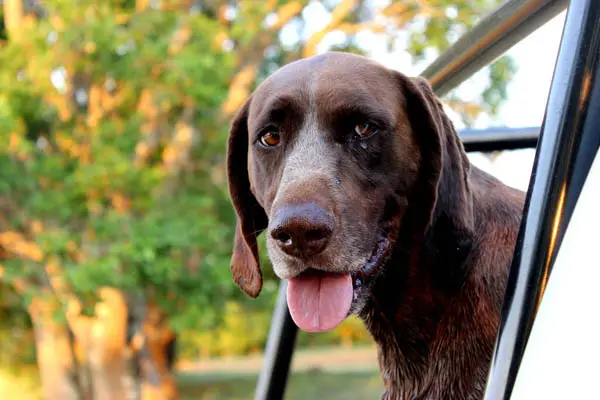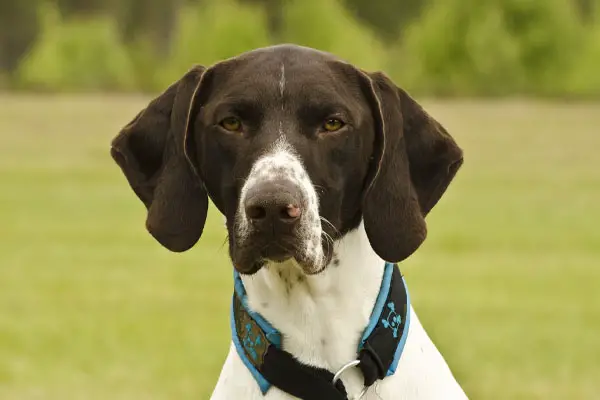German Shorthaired Pointers are one of those breeds that fit the “noble” and “aristocratic” definition. They are best described as dogs having friendly dark eyes, a dark nose, and broad ears that lie flat against the head. The coat of a German Shorthaired Pointer is short with solid liver or liver and white patterns that give them that regal look.
As a versatile sporting breed, they can be both your hunting and family companion. They are the perfect fit for people who love going outdoors. They enjoy work and play, and if you have children, then there would be no problem as German Shorthaired Pointers are very friendly.

German Shorthaired Pointer Statistics
| Dog Breed Group | Sporting |
| Breed Size | Medium |
| Height | 23-25 inches (male), 21-23 inches (female) |
| Weight | 55-70 pounds (male), 45-60 pounds (female) |
| Lifespan | 10-12 years |
German Shorthaired Pointer Ratings
| Energy level | |
| Exercise needs | |
| Requires attention | |
| Playfulness | |
| Trainability | |
| Shedding | |
| Grooming | |
| Friendly with family | |
| Friendly with kids | |
| Friendly with strangers | |
| Friendly with other dogs | |
| Prey Drive |
History
German Shorthaired Pointers were created in the mid- to late 19th century. However, early versions of their type existed way back in the 17th century. They were the result of generations of crossbreeding, and finally, German hunters were able to create the perfect multipurpose dog.
As a result of crossbreeding between Spanish Pointers and Bloodhounds, German Shorthaired Pointers are big houndlike dogs with a keen sense of smell. However, Germans don’t only want the hunting skills, but they also want to give the dog style, and elegance. So they imported Pointers from England to get the results they want. And they did!
They were able to create a hunting dog that can work well on land and water and has this elegant style surrounding them.
German hunters give credit to Prince Albrecht zu Solms-Braunfeld of the Royal House of Hanover that this breed was created. It was because of his encouragement of breeding that resulted in the exact dog they need – an all-around dog that is intelligent and a great human companion.
It was only in 1925 when a German Shorthaired Pointer was first imported. Then they started breeding them until the AKC recognized the breed five years later.
The German Shorthaired Pointer is a bird dog, duck dog, water and land retriever, has excellent endurance, and intelligent dogs. Indeed, it’s one of the most successful breeds that is even recognized in hunting events up to this day.
Temperament
German Shorthaired Pointers are generally friendly, smart, and willing to please. They are super energetic and happy dogs who love being with their humans. Leaving them alone would make them lonely, and they might have separation anxiety.
They are perfect companions for those who love going outdoors. If you’re a hunter, a hiker, runner, or biker, German Shorthaired Pointers will surely love to accompany you with those activities. It also wouldn’t matter if you have a big family with kids because these dogs can get along with anyone.
German Shorthaired Pointers are family dogs, and with proper training, it’s best to let them stay inside the house. Locking them in a cage is not a good idea as this will result in barking, hyperactivity, and destructive chewing.
When meeting strangers, they can be friendly or reserved. He may bark if he is alarmed, but he will not attack. German Shorthaired Pointers are not an aggressive type of breed. They make excellent watchdogs because of their observant and curious nature.
To ensure that the best temperaments will come out, I encourage that you give this breed early socialization.
Expose him to different surroundings and encounters to make him more aware, lessening the surprise. Strolling him to parks or stores that allow dogs will be a great idea, too, especially that he gets to meet other dogs.
Training them is relatively easy, but it might require a lot of patience too. So if you have a lot of time to spend with him, love outdoors, and would like a dependable companion, German Shorthaired Pointers might be what you need.

GSP Care Requirements
- Nutrition: German Shorthaired Pointers are strict carnivores. They don’t need starch or complex carbohydrates to keep their energy high. Instead, they need a high-quality dog food that contains zero of these ingredients. It should also not contain by-products but high-quality animal proteins instead. Look for ingredients like chicken, beef, salmon, tuna, duck, and lamb. Add fruits and vegetables too for extra nutrition. Other than the ingredients, you should also watch out for their calorie intake. Adult German Shorthaired Pointers would sometimes require between 3,000-3,500 calories per day, while puppies would only consume 1,250 calories a day. Of course, this would also depend on the activities he’s doing. If you can’t calculate the calories your dog needs, you can consult the vet to help you out too. Measuring calories is very important so we can avoid obesity and risk of any health problems.
- Grooming: German Shorthaired Pointers feature a short coat that sheds frequently. This is why regular brushing is needed to remove loose hairs before they stick on your couches and will be harder to clean. Once a week of brushing his coat will do the trick. This will also help in keeping that beautiful coat shiny and healthy. An occasional bath, probably once a month or every two months, might also be needed depending on the dog’s activities. Ears and nails will also need some checking and cleaning to ensure that their overall health is at optimum.
- Exercise: German Shorthaired Pointers are bred initially as hunters – it’s a given that they’re active and highly energetic. As their human, you would need to meet these needs. An exercise of at least one hour a day will do; if you can do more than that, then better. Also, if possible, or if you have a yard of your own, let them off their leash and let them explore. This will make them enjoy exercise more. German Shorthaired Pointers’ activities may include running, swimming, and other dog sports. It’s anything under the sun that will help them release that energy. Also, it’s better if you do the exercises with him as this makes him more enthusiastic.
- Health: German Shorthaired Pointers generally have a long lifespan but can be prone to minor diseases common to dogs. These concerns include gas torsion, hypothyroidism, hip dysplasia, osteochondrosis dissecans, and entropion. Major health problems such as lymphedema can occur too. Most of these diseases are because of the dog’s genes itself. You can check with the parents if they have existing medical conditions. If you’ve found any symptoms, don’t hesitate to visit the vet immediately. Regular check-ups will help, too.
- Lifespan: The life expectancy of German Shorthaired Pointers is 10-12 years.

Famous German Shorthaired Pointers
- Haus: A German Shorthaired Pointer donated to the 380th Air Expeditionary Wing; used to sniff explosives
- Pina: A German Shorthaired Pointer who serves TSA to sniff out explosives in boxes and crates
- C.J.: Winner of “Best in Show” at the 140th Westminster Dog Show
Fun Facts About German Shorthaired Pointers
- German Shorthaired Pointers originated from Germany.
- They were created to hunt and are even used to sniff out explosives for some organizations.
- The name “Pointers” refers to their stance; they lower their heads, keep a steady gaze, and lift one paw to signal hunters where to hunt.
- German Shorthaired Pointers’ noses always match their body color.
- They have impressive agility; eight German Shorthaired Pointers have the PACH (Preferred Agility Champion) Title.
- They have webbed feet and are very great swimmers.
Check Out Other Sporting Dog Breeds:
American Water Spaniel, Boykin Spaniel, Brittany, Chesapeake Bay Retriever, Clumber Spaniel, Cocker Spaniel, Curly-Coated Retriever, English Cocker Spaniel, English Setter, English Springer Spaniel, Field Spaniel, Flat-Coated Retriever, German Wirehaired Pointer, Golden Retriever, Gordon Setter, Irish Red and White Setter, Irish Setter, Irish Water Spaniel, Kooikerhondje, Labrador Retriever, Lagotti Romagnoli, Nova Scotia Duck Tolling Retriever, Pointer, Spinoni Italiani, Sussex Spaniel, Vizsla, Weimaraner, Welsh Springer Spaniel, Wirehaired Pointing Griffon, Wirehaired Vizslas
